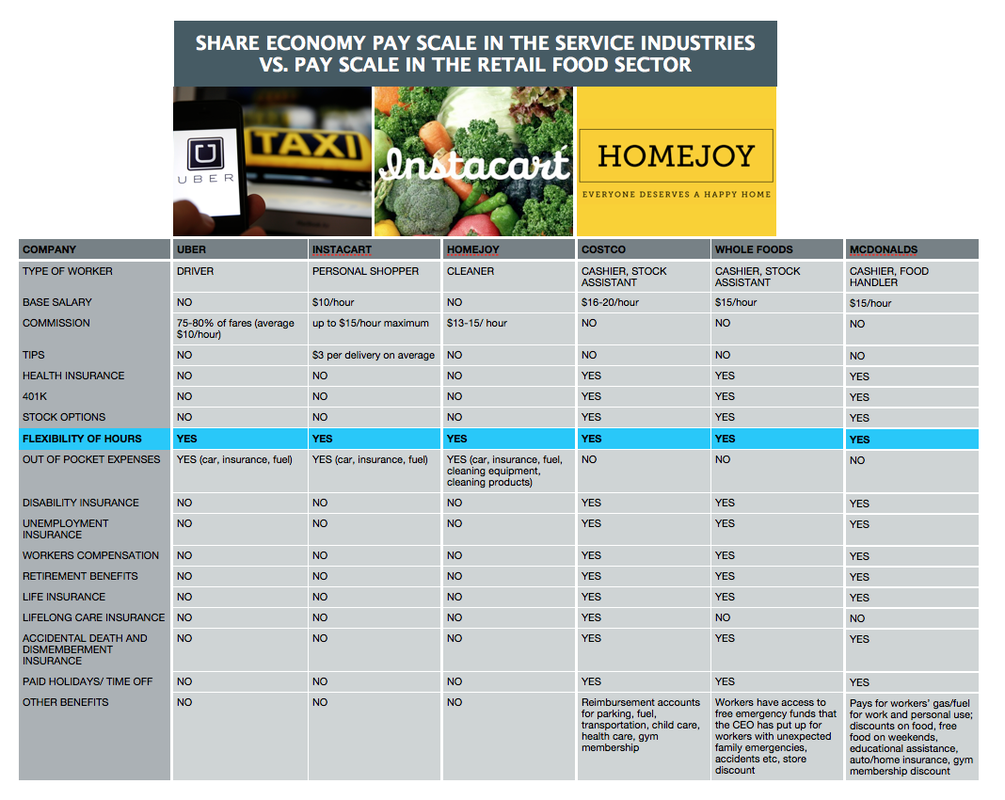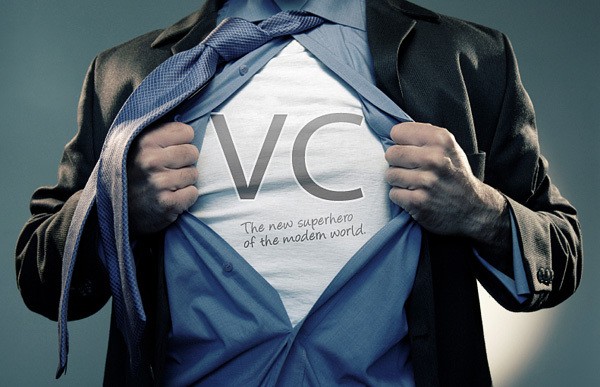
This morning, I made a quick comparison chart of pay scales between service-oriented on-demand companies such as Uber, Instacart and Homejoy with that of a few companies in the retail sector: Costco, Whole Foods and McDonalds. Surprisingly, all the companies I surveyed above had flexibility in hours, and an employee at Whole Foods only needed to work 20 hours/ week for their benefits to kick in. In a similar vein, Costco gives both full-time and part-time employees all benefits after a certain time frame. For full-time hourly workers, their benefits kicked in after 90 days or 450 hours of work (whichever came first) and for part-time hourly workers, their benefits kicked in after 180 days or 600 hours worked. McDonald's also gives their employees educational assistance for college tuition or other training along with a discounted gym membership. All three food sector companies: Costco, Whole Foods and McDonalds, gave all their employees stock options and other benefits, such as workers compensation and paid holidays and time off.
Not surprisingly, Uber, Instacart and Homejoy came out to pay their "contractors" the least, with the average Uber driver making less than $10/hour after all the out-of-pocket expenses (such as car, insurance, fuel) had been calculated.
According to Sherpa Share, 65% of Uber drivers also used other platforms to earn income, such as Lyft and Sidecar; therefore, more than half of Uber drivers were working more than a full-time shift with all the transportation platforms combined, rather than as a part-time side-gig.

Costco paid their workers the most, and their employees were reported to be happier in their jobs than employees at Silicon Valley companies. (As a bit of digression and on an amusing note, I went to a book signing by Al Gore for one of his books several years ago in San Francisco, and he said that he got the most emails and responses after being on the cover of the Costco Connection than he did when he had been on the cover of Time Magazine.)

We have to think about what kind of example we are setting for the next generation of Americans and Brits, if we were to revert to a kind of feudal culture in which the average worker for a share-economy startup is struggling to make $10/hour from "part-time" work in which 65% of Uber drivers also synonymously use other platforms, such as SideCar and Lyft, so that they can make enough to pay for their car insurance and fuel costs? What kind of nation would we be, if the average worker in the share economy has to work 3 or 4 "part-time" jobs without any benefits? These are hard questions to answer, and thus far, only entrepreneurs have come up with viable solutions, not the government.
In the past, entrepreneurs have typically solved problems in society that changed people's lives for the better, not perpetuated the mentality of slave-wage labourers in the Industrial and Post-Industrial Eras.
If a company that has a valuation higher than 80% of the companies in the S&P (e.g. Uber) says that the drivers who work for them are not exploited under-wage workers but "contractors" who make less than minimum wage (after all their out-of-pocket costs have been subtracted) then what sort of example are we setting for the next generation of thought-leaders?

John Mackey, Co-Founder, Co-CEO of Whole Foods
For entrepreneurs like John Mackey, who is a supporter of "conscious capitalism"; he has said in his book that, “Our belief is that if a company does an outstanding job caring for its team members, creating value for them, and respecting them as key stakeholders, it can successfully avoid unionization.” -Conscious Capitalism: Liberating the Heroic Spirit of Business
In a similiar vein, the CEO of Costco, Craig Jelinek has said, "I just think people need to make a living wage with health benefits. It also puts more money back into the economy and creates a healthier country. It’s really that simple."

We are living in exciting times because in our current era, entrepreneurs and venture capitalists are more powerful and influential than politicians. In comparison, politics is filled with corruption, lobbyists, underhanded deals and payoffs, in addition to being extremely slow at creating any kind of change. If we were to set an example for how our nations should be, we should seek to ask venture capital groups and startup accelerators, such as Sequoia Capital, Kleiner Perkins and Union Square Ventures, in addition to startup accelerators such as Y-Combinator, TechStars and the individual Founders of startups, how to create an ecosystem of "conscious capitalism," instead of seeking to perpetuate the exploitation of the working class.
NOTE: Homejoy will be shutting down on July 31, 2015 after being inundated with multiple lawsuits from contractors who wanted to be classified as "employees".
